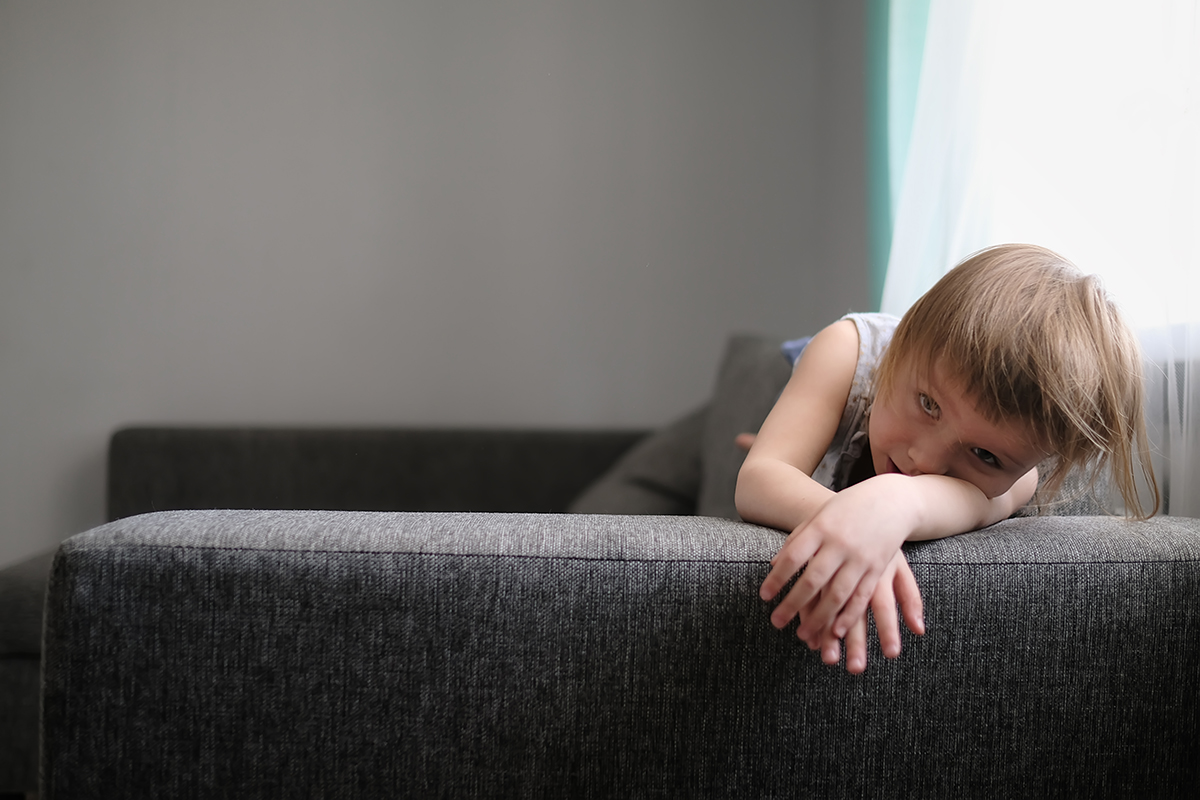Divorce can be a trying time for everyone involved. Even in amicable divorces, lives are changed, and everyone must adjust and adapt to their new lives. This is especially true when there are children involved.
Children and divorce come with their own set of concerns, but there are ways to help ensure you respect your child’s emotions during the transition.
How Divorce Affects Children
While it is understandable that you will be going through your own emotions as you face divorce, children also experience their own emotional ups and downs. Sometimes, they may not even be aware of the magnitude in which it affects their emotions and behaviors, which is why the onus to help your child manage their emotions is on you. With the help of both parents, they can navigate this adjustment with greater ease.
Here are some changes you may notice in your child as your divorce progresses.
Emotional Changes
Children navigate the situations presented to them during the divorce, which can be wildly different than those they’ve experienced before. You may witness one consistent trend, like depression or anxiety, or a variety of emotions that change with the day. It is typical for children to have questions that may impact their emotions, such as wondering if the divorce is their fault, if they could have done something better, or even resentment for one or both of the parents for the change in family structure.
Guilt is a very common emotion, especially in younger children who may not be able to comprehend the intricacies and complexities that come with divorce. However, even in the most aware and understanding kids, it is recommended that you explicitly tell them it’s not their fault. You may also have to say this more than once.
Anxiety is also a common emotion found in children, especially when major life changes occur, such as a divorce. Some of the signs of anxiety include trouble sleeping, having a hard time concentrating, avoidance, and even some physical health issues.
One way of easing the anxiety that can come with the uncertainty of divorce is informing your children of what will occur as part of the divorce. It may seem difficult at first, but these are things they will experience anyway, so informing them of the changes beforehand will help them to anticipate and navigate the changes. Staying consistent with the new plans is important to help ease their anxieties.
Behavioral Changes
It is common for children to go through behavioral changes, especially when experiencing a divorce. Unfortunately, some of these may be difficult and unpleasant. Some kids tend to act out more than usual in the midst of a divorce. This could be a result of anxiety, or it can be their attempt at understanding new boundaries with new arrangements. Creating a clear and structured environment can help with these behavior changes.
Wanting More or Less Attention
During divorces, some children desire to have more attention from their parents. This is sometimes referred to as regression because they ask for assistance and attention regarding things they previously completed independently. They may lean on you more for help and support in ways they didn’t before.
On the opposite end of the spectrum are kids who withdraw and ask for less attention. They may stop being interested in certain activities that they used to enjoy or want to spend less time with family and friends. This can also be a sign of a number of other things such as depression or losing focus, both of which are sometimes found in children during divorce.
What Your Children Need From You
Children go through a wave of emotions when their parents’ marriage is dissolved and life begins to change. They can experience sadness, anger, guilt, fear, and shock. While you may not be able to shield them from these emotions, you can help them navigate them so they can cope with the changes with greater ease.
Tell the Kids About the Divorce
Use wisdom regarding what details to share with your children and which they do not need to know. Keep in mind that you will definitely want to inform them in some way about the divorce well in advance, and what the upcoming changes mean for them and your family as a whole. You can give a simple, honest reason for the divorce. Too much detail and especially blame may cause confusion in them. Be empathetic and make yourself open and available to any questions they may have.
Present a United Front
If you can, schedule time for you and your ex-spouse to tell the children together. This way, they can see a united front even though the two of you won’t be married anymore. You can also plan the conversation ahead of time so they will have the information they need well before any divorce events occur.
Keep It Age-Appropriate
Speak to them in age-appropriate terms. Younger children need short, simple explanations. Older kids may ask for more details. In particular, avoid blaming each other, even if one spouse does carry the majority of the blame.
Provide Reassurance
Don’t forget to reassure your children of the love you have for them and that the divorce is not their fault. Let them know that they will not be neglected and will still be cared for. Having this reassurance can provide comfort in a time of uncertainty.
Provide Stability
Divorce can bring a feeling of instability to children. Even in the most stable environments, children will still have to adjust to whatever new changes come in the eyes of a divorce. Providing stability will help them navigate their thoughts and emotions while also providing a sense of safety in their lives.
You can offer stability by providing them with a consistent routine. In some cases, you may not have to change a lot with their routines. You will just need to stick to this routine, preferably with the cooperation of your ex-spouse. Even if your spouse is not cooperative, you can still provide stability for your children when they are in your care.
Be Emotionally Available
Children will have questions and emotions regarding the divorce. It is important to make yourself available for any questions they have or any thoughts and feelings they want to express. It may not always be easy to hear their side of things, but being a safe space for them will help provide security.
Some children may seclude and withdraw, so you may want to set aside time to remind them that you are available to talk or even initiate conversations to leave the door open for them to process their thoughts. They may not always respond, but knowing you are nonjudgmentally available will help them when they are ready to share.
What Not to Tell Your Children in a Divorce
It can be tricky to determine the exact words to say to your children in the midst of divorce. There are no words that can remove the emotional blow that may come from the news, but there are things you can avoid saying that would cause unnecessary damage.
Avoid Blaming
Avoid blaming yourself or your spouse. This can cause children to feel torn between the two of you and feel like they must choose sides. Even if one parent is solely to blame, vocalizing this can increase guilt and confusion in your children.
Avoid Sharing Negative Remarks, Conflicts, and Adult-Level Concerns
In addition to avoiding blame, avoid any type of negative comments about your spouse. For instance, you may want to refrain from sharing how one of you did not communicate well, engaged in infidelity, had issues with money or gambling, or any other details of conflicts, disagreements, and arguments. This can cause a parental strain between the child and their parent. It can also cause confusion if the children are too young to grasp such concepts.
Avoid Emotional Dumping or Denials
It is especially important to avoid unloading your own emotions onto your child. This can create an unnecessary burden on them. Still, be careful not to deny your emotions altogether. It is perfectly healthy for children to know that you are sad or have other emotions, but keep them appropriate and model healthy ways of coping.
How You Can Support Your Children During This Time
There are some things you can do to support kids during a divorce, but there are also things you can do in general that will help contribute to their ability to navigate the divorce with ease.
Remain Calm
Children learn well through modeled behavior. If they witness highly stressful emotions from you during the divorce, chances are they will experience them too. However, if they notice that you are calm, even in the midst of your emotions, they are more likely to exhibit that calm, too. Your calmness reassures them that everything will be ok, even during times of uncertainty.
Remain Civil
Conflict is normal between ex-spouses during a divorce. It is easy to want to vent your frustrations, even with your children around. However, it is important to remain civil about your ex, especially around your children. This can ensure that they have no animosity towards their other parent, particularly animosity that derives from the other adult in the relationship. Remaining civil allows your child to formulate and continue their own relationship with their other parent on their terms and based on their own views rather than yours.
Try to refrain from speaking negatively about the other parent. And model compromises along the way, especially in regard to child custody or visitation. If your child witnesses you trying to work with the other parent, even if the other one is uncooperative, this can help them in the long run. If you do have an uncooperative ex-spouse, creating a stable environment at your home will help your children greatly.
Seek Support
There are resources available for divorced parents with children. You may also want to lean on friends and family who can help you if you are in need in any way. There may be programs through your child’s school or community centers that assist them in the transition. Your child may
also benefit from speaking with a counselor or therapist in some situations. It is important for both you and your children to feel supported during this time.
Take Care of Yourself
As mentioned, it is important not to unload your emotions on your child or lie to your children about the realities of the divorce. They may even see you cry or get frustrated every now and then. However, it can be helpful if they see you taking care of yourself during this time.
Taking care of yourself does not mean to ignore the very real emotions and changes you go through. It means taking care of yourself and coping with them properly. When you do this, you help your children to cope well, too.
Some healthy ways of coping include taking care of your body through eating well and exercising. Exercise can help relieve stress that has been housed in the body. While it is tempting to eat junk foods and comfort foods while secluding yourself at home, taking steps in your physical health will be good in the long run for both you and your children.
You can also take care of yourself by picking up a healthy habit or hobby. Do something fun that you enjoy, spend time with friends and family, and journal your thoughts, feelings, and emotions. Find ways to laugh and smile with yourself and with your children.
Contact Desert Legal Group
If you are facing a divorce, one of the best ways you can protect your children is to secure fair terms as seamlessly as possible while keeping the children’s best interests at the forefront of every decision.
Desert Legal Group’s skilled divorce attorneys can help you negotiate a divorce settlement efficiently for minimal impact on your family.
Contact us today to schedule a consultation.
Resources
- Quick Guide to Anxiety in Children. (n.d.). Child Mind Institute. https://childmind.org/guide/anxiety-in-children-quick-guide/
- Miller, C. (2016). How Can We Help Kids With Transitions? Child Mind Institute; Child Mind Institute. https://childmind.org/article/how-can-we-help-kids-with-transitions/
- AACAP. (2019). Children and Divorce. Aacap.org. https://www.aacap.org/AACAP/Families_and_Youth/Facts_for_Families/FFF-Guide/Children-and-Divorce-001.aspx
- How to Talk to Your Children about Divorce. (n.d.). HealthyChildren.org. https://www.healthychildren.org/English/healthy-living/emotional-wellness/Building-Resilience/Pages/How-to-Talk-to-Your-Children-about-Divorce.aspx
- Anderson, J. (2014). The Impact of Family Structure on the Health of Children: Effects of Divorce. The Linacre Quarterly, 81(4), 378–387. https://doi.org/10.1179/0024363914z.00000000087

Attorney Cory Keith is an exceptional legal professional dedicated to providing effective representation for his clients. Driven by the belief in treating others how he would want himself represented, Mr. Keith has earned a name for himself for his unflagging advocacy and compassionate approach to law.
Mr. Keith attended Arizona State University, earning his Bachelor’s in Criminal Justice and Criminology through a full academic scholarship. With outstanding performance, he received another full ride academic scholarship to attend law school, where he demonstrated exceptional leadership abilities by accepting executive roles in various organizations as well as serving as legal clerk at multiple well-respected law firms.




